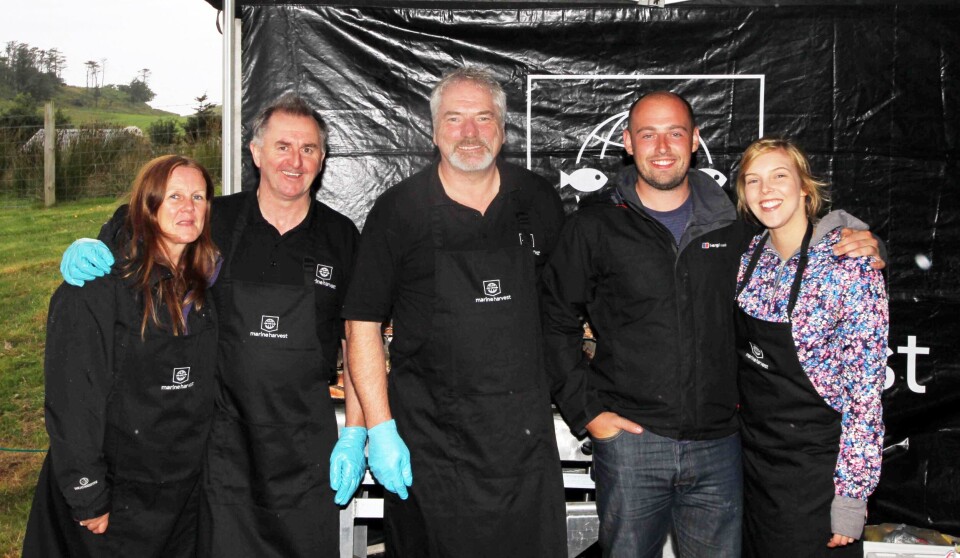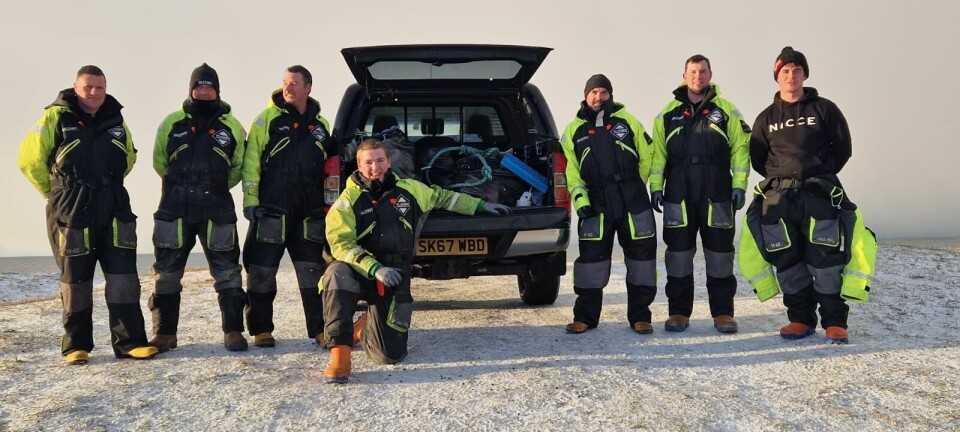
Investing in communities in Scotland
It is both important and beneficial for the Scottish salmon farming industry to be involved and invest in the communities of which it operates to remain socially sustainable.Siri Elise Dybdal
In recent years, it has become increasingly common for companies to implement corporate social responsibility into their business models. In the salmon farming industry, this often involves making a difference to community life in the areas where the producers operate.
Across the board, Scottish salmon farming companies contribute to their local communities– often in rural and remote locations – both with financial support and through other various measures. Industry players say they believe that in order for the companies to thrive, the communities where they are located also need prosper.
Necessary
Steve Bracken, business development manager for Marine Harvest Scotland, considers community involvement crucial for his firm: “We believe that without being involved in the community or being part of that community, ultimately you won’t have a farm.”
He says support can come in many forms: “Supporting the community doesn’t always involve providing financial support. For example, we support our employees who want to get involved in voluntary organisations such as community councils, Royal National Lifeboat Institution, Scottish Fire and Rescue Service and Scottish Mountain Rescue. With our salmon barbecue, we raise money for various local charities where we cook salmon and all we ask for is a donation towards the charity. Over the years we’ve raised thousands of pounds,” Bracken says
He emphasises that such initiatives in effect is putting something back into the community that is not just financial, but something the whole community can benefit from.
“Social sustainability is as important as environmental and financial sustainability with all three needing to be linked for our industry to thrive. Basically in order for Marine Harvest to thrive we depend on thriving local communities,” Bracken claims.
Shinty
Marine Harvest Scotland’s main sponsorship is with the sport of shinty through the sport’s governing body the Camanachd Association.
“Shinty has been described as ‘hockey without the rules’ and is Scotland’s national sport played in many parts of the country where we have a presence either with a hatchery, farm or processing plant. We believe that if you are going to sponsor and be taken seriously, you cannot be a dilettante and that is why we have supported shinty for over 28 years - which is well over half of MHS’s 50 years existence! From the feedback we get from those involved with the sport we know this long term support is appreciated,” Bracken says.
He adds that shinty is growing within the youth and women sectors. “Both are very active in the sport, something we are very proud to see.”
Broad range
Providing housing is another initiative the company has supported: “In recent times, on the isle of Muck for example, we have built houses to provide for our farm staff where there is a lack of local housing. So rather than have our staff live on a feed barge at the farm we are very much part of the community. We also now provide a community trust fund for the island, which is administered by a local committee including Marine Harvest.”
Bracken says the firm treats every case for support on its own merits “and in assessing we do apply set criteria to make sure we are being fair and consistent.” Coming up, he says Marine Harvest Scotland will be supporting an innovative youth initiative: “Our next main support is with The Outward Bound Trust which supports up to 30 school children each year to develop their confidence and skills on a five day rural residential course.
“At the end of the course these young people give us feed-back on what they’ve gained from the experience and without doubt it’s seen as a positive one. Albeit some have never experienced the great outdoors and found it very challenging it’s clear they have pushed themselves in taking part,” he says.
Martin Davidson, my Scottish director of The Outward Bound Trust, says it has been working in partnership with Marine Harvest Scotland since 2012. “Their support has enabled over 175 young people in the communities where they operate to have an Outward Bound experience. This partnership approach has enabled Marine Harvest to develop a strong relationship with their local schools and young people in their local community.
“Through their Outward Bound experience, the young people have developed their confidence and acquired skills in teamwork and communication, at the same time, they have improved their emotional well-being so they are able to face challenges and use the determination and perseverance they have developed to achieve their goals. Qualities which will enable them to thrive in education work and life, without the generous support of Marine Harvest Scotland and their passion for engaging with their local communities, this would not have been possible.”
The Heart of the Community Trust
Scottish Sea Farms (SSF) is another producer that has a broad involvement with local communities through its Heart of the Community Trust (HCT) initiative. “As a major employer and part of an integral industry to many remote communities along the west coast, Shetland and Orkney Islands, Scottish Sea Farms has recognised its important role within the social and economic sustainability of many local areas. “The Heart of the Community Trust was launched in 2011 with the principal aim of supporting charitable and community initiatives within isolated communities. Our approach has also acted as a platform to engage directly with communities to increase general knowledge of the aquaculture industry,” the company said. To date, £500K has been distributed across 145 projects in coastal communities that have limited access to any other funding sources.
The company explains that the objective is to provide lasting change, and says the HCT selection process is based on the following criteria: Health & well being, education, personal development that would lead to the enhancement of a community and community projects that benefit the majority.
Crucial assistance
According to the SSF, one of the most rewarding and well-received HCT projects has been the investment at Newcraigielea respite centre in Lerwick, Shetland. The centre was reopened in 2007 as a purpose built facility, and currently operates as the only short break service in Shetland offering support for up to 36 adults with learning disabilities.
“A need was identified in 2014 for a dedicated sensory area where service users could relax and be stimulated. Sensory rooms are widely used across education and care settings for people with learning disabilities. These environments – a mixture of lighting effects, music, aromas and textures - are proven to provide therapeutic benefits. “As a result of a downsizing of public services there was no opportunity to secure funding to deliver this facility. The centre staff sought to address the shortfall with a fundraising campaign. It was however quickly recognised that this would be a lengthy process, relying on local benevolence.HCT supported this worthwhile project, donating over £10K to purchase all of the equipment required to create the sensory room,” SSF states. Newcraigielea team leader, Fiona Hillyear said they had been very grateful for the company’s support: “This fantastic new room provides a safe space with wonderful sensory experiences for people who have varying degrees of support needs.
“The people who access our service are very excited about the room and everyone is extremely grateful to the Scottish Sea Farms Heart of the Community Trust for granting us the funds to make this all possible.
“Each year we have more young people being referred to us once they leave children’s services and others who are referred to us from other sources.” Since the inception of HCT four years ago, SSF has, through local consultation, identified some of the key challenges that are faced by projects in rural communities. The firm strongly believes that facilities such as Newcraigielea would not be able to develop and offer the same level of support without assistance from the Trust.
“HCT is a vital grant source to these remote areas, and it helps to establish the salmon farming industry as a positive contributor to Scottish community life. “Scottish Sea Farms remains committed to HCT and in July 2015 there are nine projects about to receive cash support that totals £19,456,” the company told FishfarmingXpert.
Creating new opportunities
The Scottish Salmon Company (SSC) says it is also committed to working closely with local people to create new opportunities Craig Anderson, managing director of SSC, says the company aims to be in the heart of community life: “Our business is based entirely in Scotland and the majority of our farms are located in remote, rural locations along the West coast of Scotland and the Hebrides.
In many instances, we are often the major employer in these rural communities and bring strong economic benefits to the area. “We want to be at the heart of community life, supporting activities and education by promoting health and wellbeing – giving something back is extremely important to us.”
“Working closely with our teams on the ground we have identified a variety of initiatives to support. Recent examples include our ongoing sponsorship of the Western Isles Island Games Association; bringing judo to the Hebrides and sponsoring a leading instructor to introduce young children on the islands to the martial art.
“We also support the charity, the Sandpiper Trust and have raised funds through our own company event, The Salmon Run, to buy defibrillators for remote communities. We are committed to work closely with local people to create new opportunities across these rural locations and look forward to continuing our programme in the years ahead.”
Part of the community
Smaller producers such as Wester Ross Salmon also carries out several community support initiatives. On community and sense of place, the salmon producer states it is strongly committed to the local community: “We take care of the area like it’s our home — because it is. We live here, have children in school here, and are the largest employer in town with a staff of 35. Based in coastal town of Ullapool, Wester Ross Fisheries is owner-operated by lifelong members of the community. And because we are an independently owned farm, the value we build in our fish is value we build for the local economy. Our personal commitment to the area extends into a business commitment.”
According to Wester Ross Salmon’s website, the company source as much as possible locally, and support the local schools, including bringing kids out to the farm and engaging with them in home economics so they know how to cook and enjoy the food of the area. It states that it has an open-door policy for local community members and area businesses, such as fishing lodges who have interests in the same waters they do. The farm also employs former commercial fishermen who can no longer make a living on the herring vessels.




















































